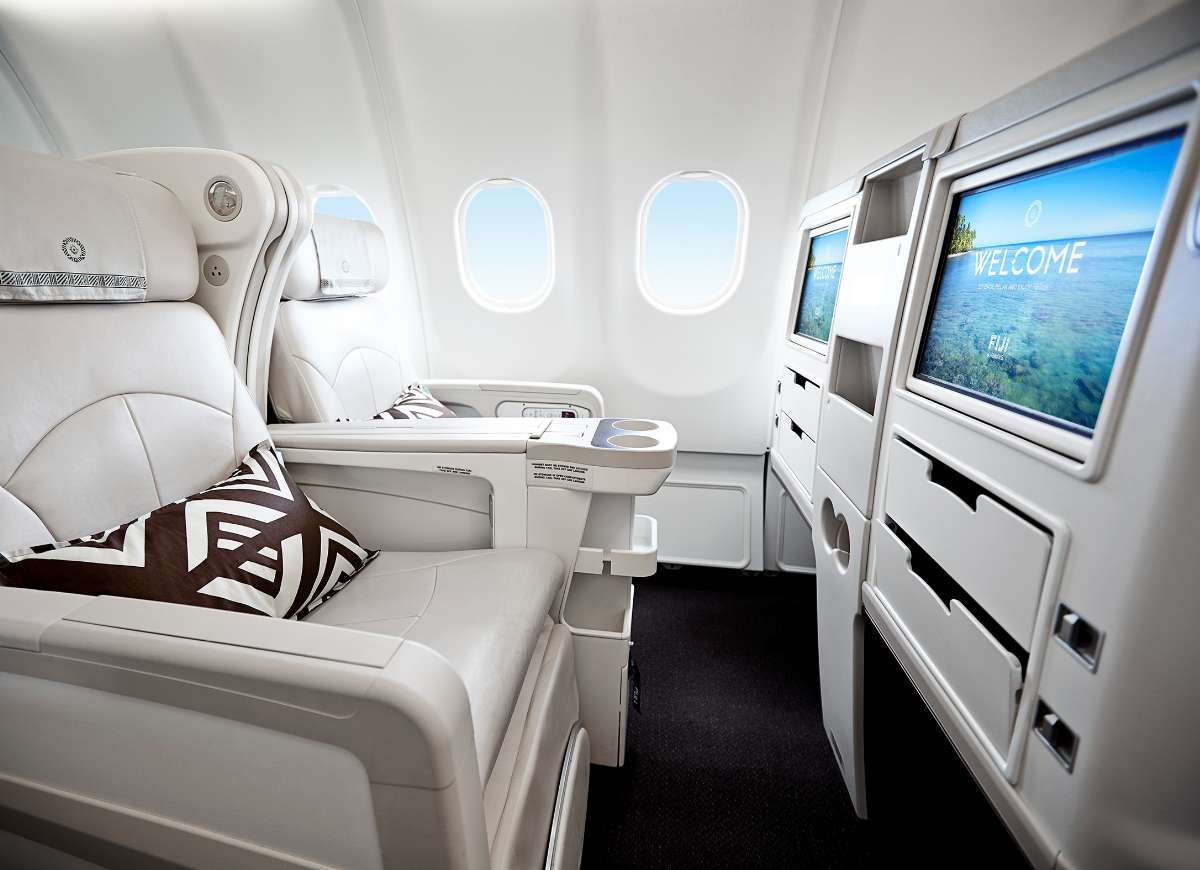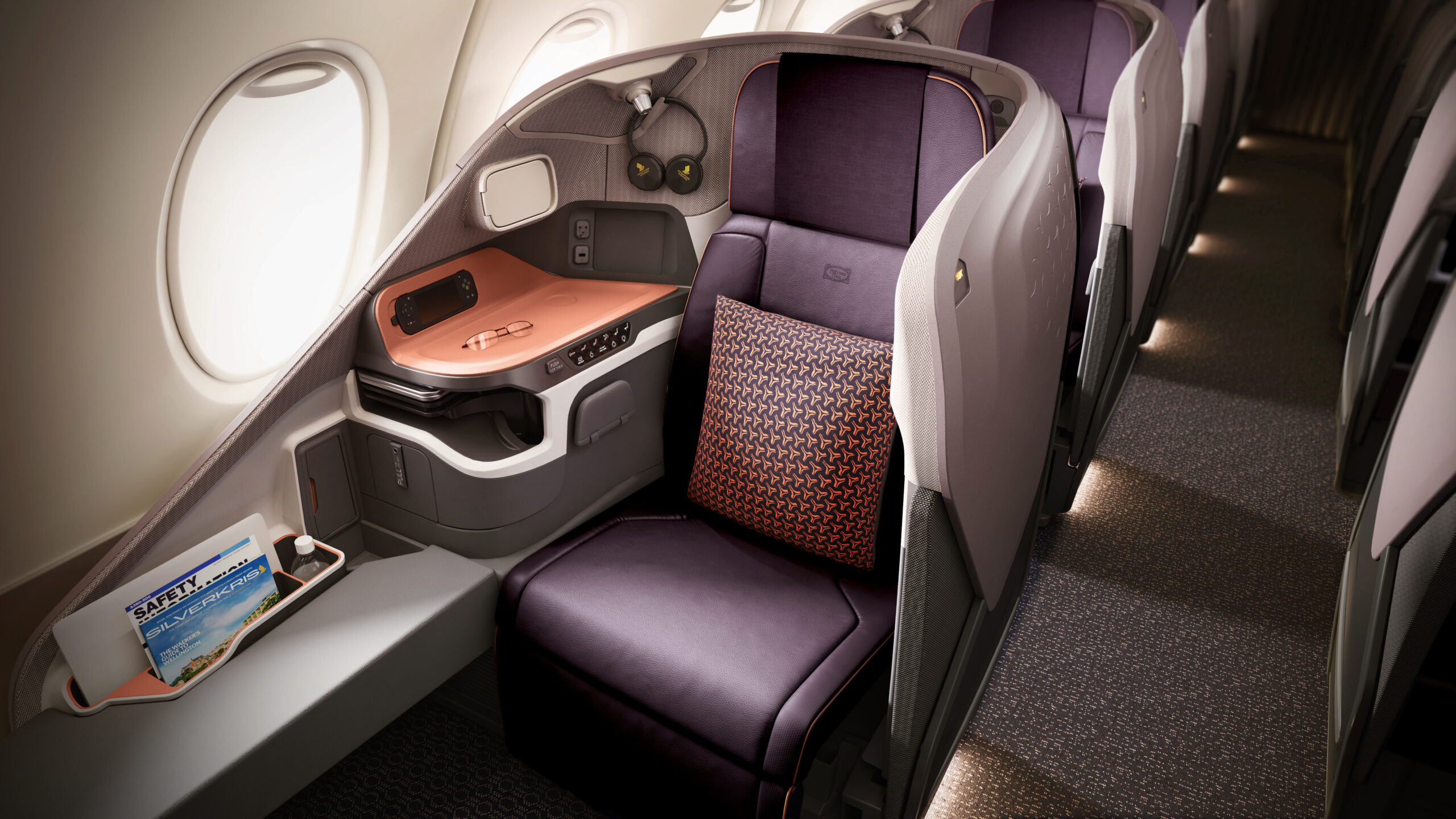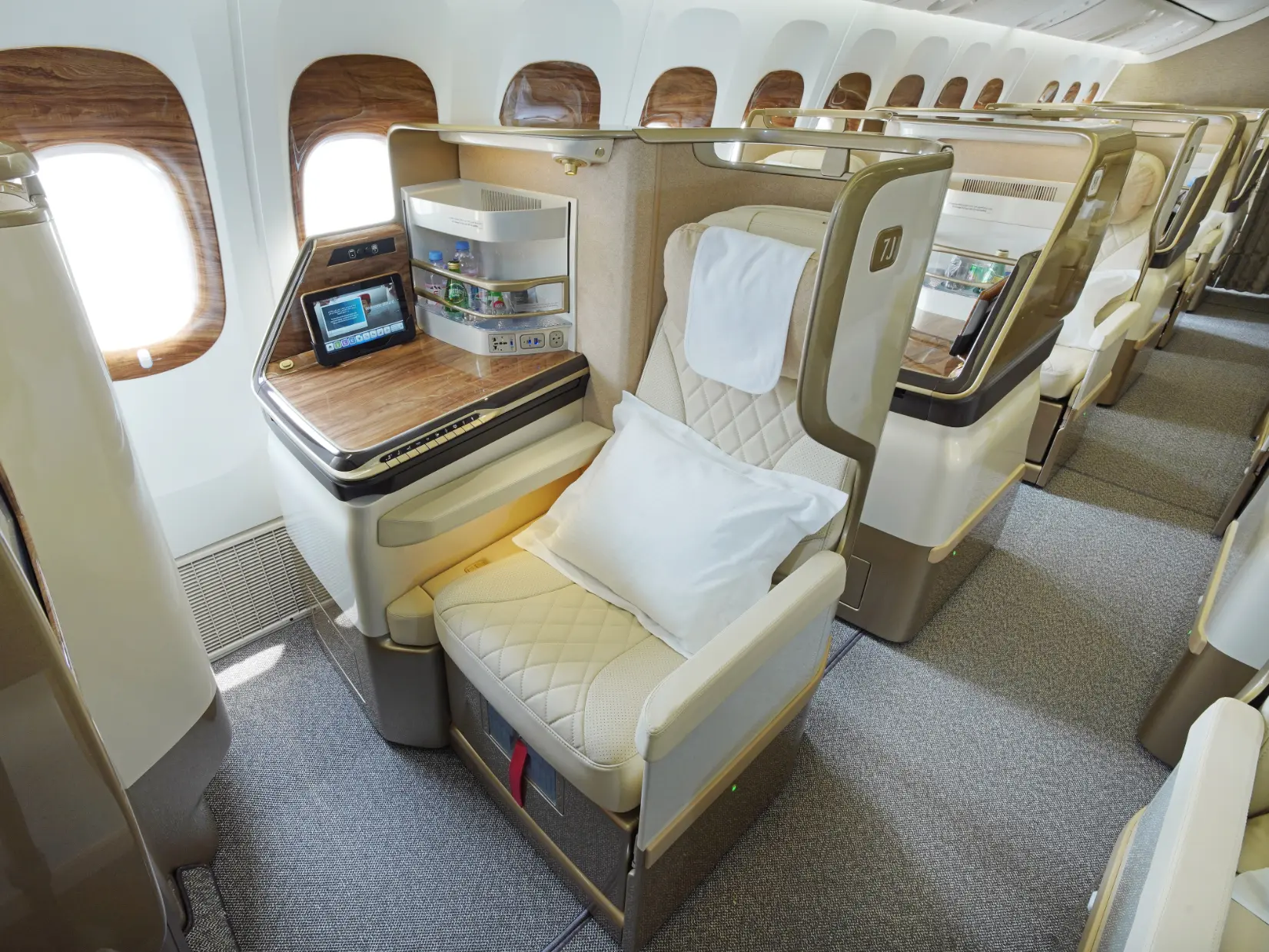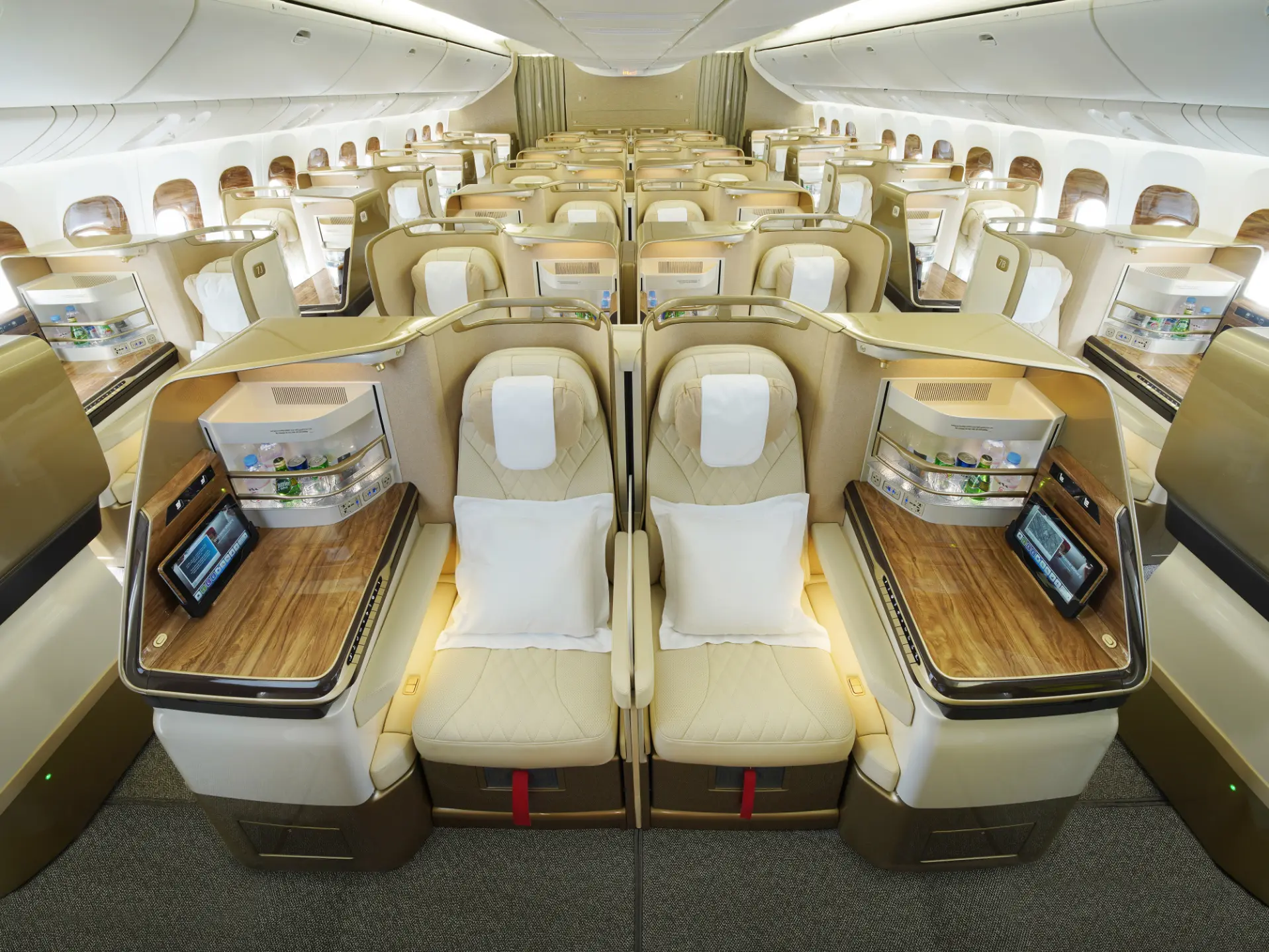Multiple Regions Flying
Fly in the “pointy end” with the kids (minus the guilt)

For households filled with comfort and luxury, why does air travel become the one place to draw a hard line?
Fresh off his star-studded performance headlining Sydney’s 2024 New Year’s Eve celebrations and his Melbourne show days later, Robbie Williams has been back in the spotlight. But beyond the stage, the singer and his wife, Ayda Field, have sparked discussion with their approach to family travel. Despite their status and wealth, the couple has publicly shared their preference for flying their children in Economy, a choice they say keeps them “grounded.”
This sentiment echoes similar remarks by celebrity chef Gordon Ramsay, who famously declared his children would never fly First Class to teach them the value of hard work. Both couples highlight an intriguing tension between privilege and parenting.
But for households filled with comfort and luxury, why does air travel become the one place to draw a hard line? Is this truly about instilling humility, or does it reveal a deeper inconsistency in how we approach privilege? And it’s not just celebrities – this equally applies to many well-to-do families.

The magnification of class in the skies
Flying has always amplified socio-economic divides. The boarding process itself sets the tone: First and Business Class passengers are invited to board at their leisure, bypassing the long, winding queues of Economy passengers waiting their turn.
Once onboard, the contrast becomes even more pronounced. Economy passengers walk through the luxurious First and Business Class cabins, where spacious seats, ample legroom, and pre-departure champagne await. It’s a fleeting glimpse of indulgence before the curtain is drawn, separating the “pointy end” from the rest of the aircraft. Few experiences highlight “class systems” as starkly as air travel.
This visibility makes the debate about children flying First Class particularly charged. For parents, it’s not just a question of comfort or practicality – it’s also about perception. Will they appear indulgent, spoiling their kids with extravagance? Or are they teaching the next generation to remain “grounded” despite their privilege?
The inconsistent standards of luxury
What makes this attitude so curious is the stark contrast to other aspects of affluent lifestyles. The same parents who refuse to let their children fly First Class often provide them with every other conceivable comfort.
Consider this.
For celebrities, their children might live in sprawling estates with private wings, gyms and theatres. For the rest of us, it might just be a spacious family home with a pool. Either way, no child is asked to pitch a tent in the backyard to “stay grounded.”
For a family holiday, celebrities might book the Park Hyatt penthouse or an entire private villa. For middle-class parents, it might be a standard room at the Park Hyatt or a luxurious Airbnb. Either way, the kids aren’t booked into a budget motel while the parents enjoy the luxury.
For dining, celebrities might frequent Michelin-starred restaurants, while others might opt for a fine-dining establishment. Yet, the kids aren’t sent to eat takeaway or fast food while their parents enjoy a gourmet experience.
And for transport, celebrities might drive Bentleys or Rolls-Royces, while others might own Mercedes or Audis. Regardless of the car brand, the kids aren’t walking or taking the bus to “stay humble.”

Many households employ cleaners and gardeners because both parents work full-time jobs. Are the children scrubbing floors or mowing the lawn to “learn the value of hard work”? Likely not.
Children attending private schools are often chauffeured to the school gate, bypassing public transport entirely. Parents may act as unofficial Uber drivers, ferrying kids between sports, birthday parties, and tutoring sessions. Is this reinforcing humility or fostering a reliance on convenience?
Flying First Class becomes a symbolic stand, but when viewed in the context of their daily lives, it seems like a token gesture. If there’s no effort to keep children “grounded” in other aspects of life, how impactful is this singular lesson?

The empty lesson?
The idea that an Economy flight will instill humility or work ethic is questionable. Are children truly learning about privilege and hard work from a cramped seat on a plane, or is this simply a hollow lesson that’s quickly forgotten upon landing?
For many parents who have risen from modest beginnings to achieve significant success, this decision seems rooted more in their own psychology than their children’s. It’s a reflection of the guilt or anxiety they may feel about providing a life of abundance, paired with a desire to shield their children from entitlement. But does a single act like flying Economy achieve that goal, or does it simply highlight the inconsistency?
Perhaps the hesitation isn’t really about flying First or Business Class – it’s about the cost. A child’s Business Class seat costs the same as an adult’s, yet kids rarely make full use of the experience. They don’t enjoy the free-flowing French champagne or aged whisky, their meal preferences are often simpler than the lobster and caviar on offer, and their shorter legs don’t need the lie-flat seats or extended legroom.
For adults, the value of a Business Class ticket often lies in the indulgences: the premium food, endless drinks, and luxurious service. For some passengers, the cocktails, wine, and champagne alone could easily add up to hundreds of dollars, but children simply don’t benefit from these extras. This mismatch between price and value is what makes purchasing multiple pointy-end tickets for a family feel especially painful.
For a family of four, the cost of flying flat can rival the price of a new car. It’s no surprise that such a high price tag gives parents pause.
The solution: Flying smarter with points
But what if the guilt of spending big money on tickets could be removed entirely? The solution lies in using points strategically. By leveraging points, families can fly Business Class for half the cost – or even less. This makes flying in the ‘pointy end’ feel less like an indulgence and more like a smart, practical choice. Using points effectively transforms premium travel from an extravagant splurge into an affordable reality. It’s not about giving up comfort or creating inconsistent standards it’s about flying smarter. And when flying smarter means flying guilt-free, everyone wins.
Steve Hui is the founder of iFLYflat – Australia’s number one website dedicated to using points to fly Business Class from Australia to the world.
Latest Articles
Don't miss the latest from Luxury Travel
